Civil rights movements
In our collections
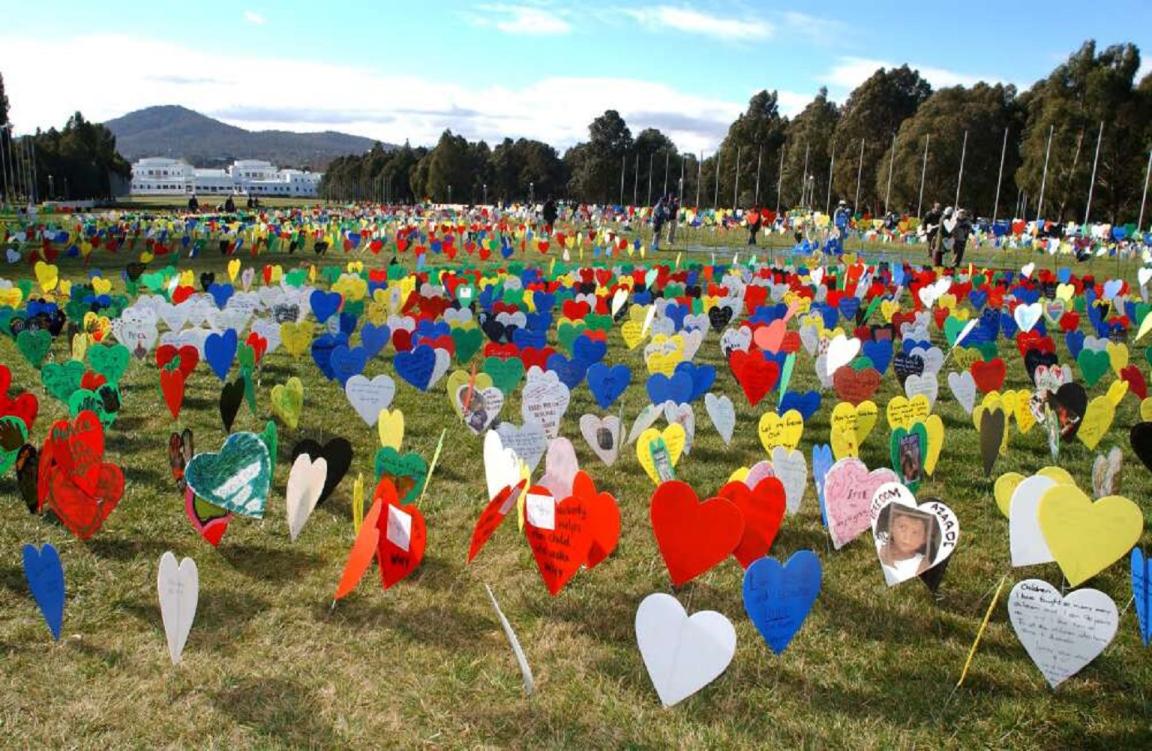
Loui Seselja, View over the field of hearts display, with old Parliament House in background, United Nations World Refugee Day and Field of Hearts event, Canberra, 2004, nla.gov.au/nla.obj-130943483
Loui Seselja, View over the field of hearts display, with old Parliament House in background, United Nations World Refugee Day and Field of Hearts event, Canberra, 2004, nla.gov.au/nla.obj-130943483
Civil rights for some Australians have only been earned after many years of protest and advocacy. While there have been many protests for civil rights in Australia, this section will focus on what the Library has material to provide information on. Use this guide to help find and access resources in our collection about the Aboriginal Day of Mourning, the Freedom Ride, the Aboriginal Tent Embassy protest, the Cronulla Riots and the Black Lives Matter protests.
Just getting started?
For general sources and search tips to navigate our collections on protest, participation and dissent in Australia, go to our protest and dissent research guide.
The Freedom Ride 1965
In 1965 Charlie Perkins led a group of university students from the University of Sydney across regional NSW, protesting the treatment of First Australians in regional towns in what was known as the Freedom Ride. The Freedom Rids became one of the most important protests of its time, exposing the systematic racism in regional NSW. It even inspired singer-songwriter Troy Cassar-Daley to write his song, Freedom Ride.
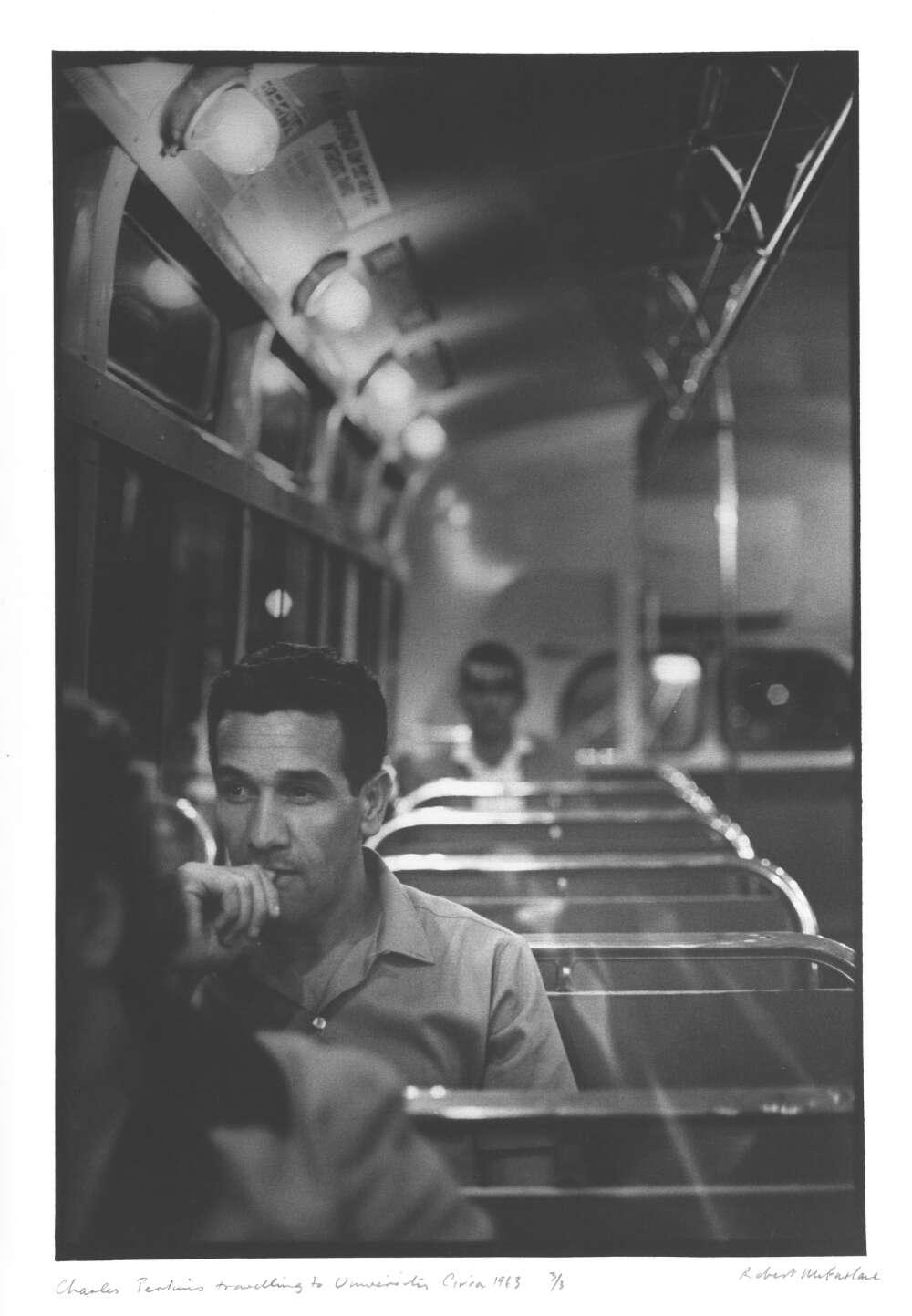
Robert McFarlane, Charles Perkins travelling to University, 1963, nla.gov.au/nla.obj-136494589
Robert McFarlane, Charles Perkins travelling to University, 1963, nla.gov.au/nla.obj-136494589
Key sources
The National Library has a large collection a material about the Freedom Ride, including numerous audio recordings of interviews and manuscript materials.
- The Papers of Charles Perkins: a range of documents from his time as an activist and secretary of the Department of Aboriginal Affairs.
- Audio recording of Ann Curthoys interviewed by Susan Marsden: Ann Curthoys was a participant of the Freedom Ride and recorded the events in her diaries.
Search tips
Use keywords to search by title, author or subject in the catalogue or Trove.
Try these search terms:
- Freedom Rides 1965
- Charles Perkins
- Ann Curthoys
Where else to look
To learn more, go to the AIATSIS explore page about the 1965 Freedom Ride.
Aboriginal Tent Embassy protest
On 26th January 1972, Michael Anderson, Billy Craigie, Tony Coorey and Bertie Williams placed a beach umbrella on the lawns of Old Parliament House (then the Parliament building) and named it the Aboriginal Embassy. Their actions were in protest to the refusal of the government at the time to recognise First Australia land rights. From here, the protest grew and the umbrella was replaced by numerous tents and a large following.
Today, the Aboriginal Tent Embassy still stands as a continuing protest for the rights of First Australians.
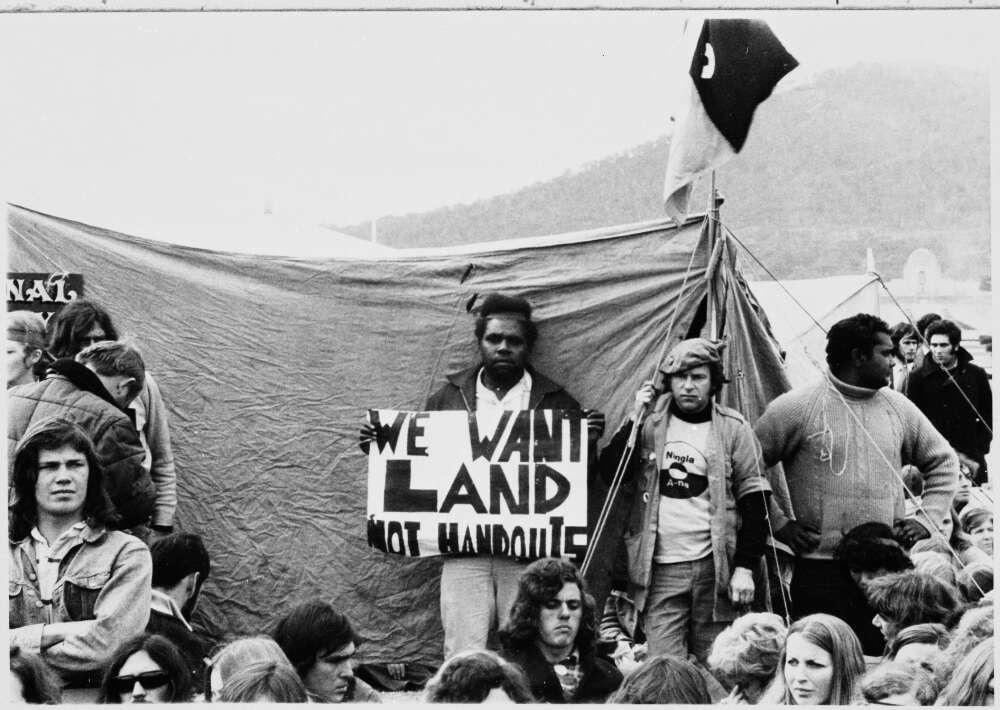
Ken Middleton, Demonstration with 'We want land not handouts' placard at land rights demonstration, Parliament House, Canberra, 1972, nla.gov.au/nla.obj-149418663
Ken Middleton, Demonstration with 'We want land not handouts' placard at land rights demonstration, Parliament House, Canberra, 1972, nla.gov.au/nla.obj-149418663
Key sources
The National Library has collected a substantial number of related materials over the years, with a large collection of pictures, ephemera, journals and newsletters.
- Aboriginal Embassy ephemera material: a collection of advertising material, area guides, booklets, brochures, samples of merchandise postcards, posters, programs, stickers and tickets from the Aboriginal Tent Embassy.
- Audio recordings: there is also a range of audio recordings of interviews with participants of the Aboriginal Tent Embassy, such as this interview with Pat Eatock.
Search tips
Use keywords to search by title, author or subject in the catalogue or Trove.
Try these search terms:
- Aboriginal Tent Embassy 1972
- Aboriginal Embassy
- Ken Middleton
- Tony Coorey
- Billy Craigie
The Cronulla Riots
On the 11th December 2005, five thousand people gathered on Cronulla Beach, Sydney. The riot was initially in response to an assault on three lifesavers days prior, but was further incited by the media and some nationalist political groups. Known as the Cronulla Riots, violence towards people of ‘Middle-Eastern appearance’ spread from Cronulla to surrounding suburbs over a period of three days.
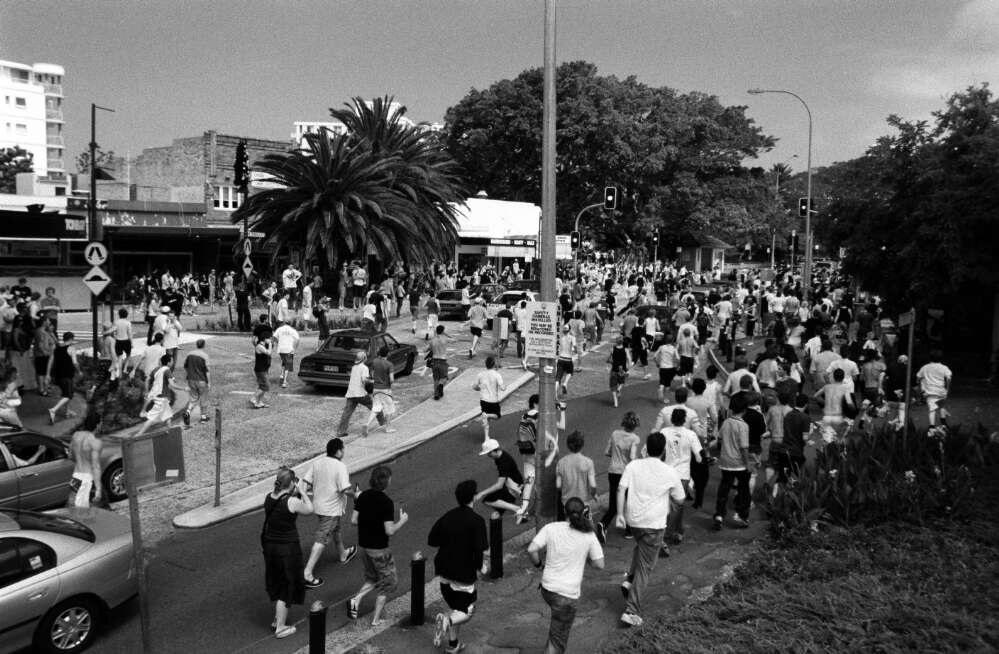
Andrew Quilty, Hundreds of rioters run up Cronulla Street for the Cronulla Railway station where an attack on men of Middle eastern appearance followed, during the race riots in Cronulla, 11 December 2005, nla.gov.au/nla.obj-152706531
Andrew Quilty, Hundreds of rioters run up Cronulla Street for the Cronulla Railway station where an attack on men of Middle eastern appearance followed, during the race riots in Cronulla, 11 December 2005, nla.gov.au/nla.obj-152706531
Key sources
We hold a unique collection of material from the Cronulla Riots, with materials from our digitised newspaper collection, pictures collection and eResources.
- The Australian Jewish News: coverage of the events of the Cronulla Riots to gain insights into the events leading up to the race riots.
- NewsBank: a newspaper resource with numerous other articles from Australian newspapers that cover the Cronulla Riots. You need to visit the Library in person or log in using your membership number to use Newsbank. Find out more about how to use eResources.
Search tips
There is also a large collection of digitised newspapers, magazines and journals, pictures and eResources available. Use keywords to search by title, author or subject in the catalogue or Trove.
Try these:
- Cronulla Riots
- Cronulla Race Riots
- Andrew Quilty Cronulla Riots
You can also search using these subject headings:
- Racism -- New South Wales -- Cronulla -- Photographs
- Race riots -- New South Wales -- Cronulla -- Photographs
- Riots -- New South Wales -- Cronulla
- Social conflict -- New South Wales -- Cronulla
- Islamophobia -- New South Wales
Where else to look
Find out more using the National Museum of Australia’s Digital Classroom Defining Moments module on the Cronulla Race Riots
Black Lives Matter protest
Following the death of George Floyd in the United States, protests against institutionalised racism in the US gained momentum. On the 5th June 2020, Black Lives Matter protests were organised across Australia’s major cities. The rallies protested the continuing rise of Indigenous Australian deaths in custody and the lack of implementation of the 1991 Royal Commission into Aboriginal Deaths in Custody recommendations.
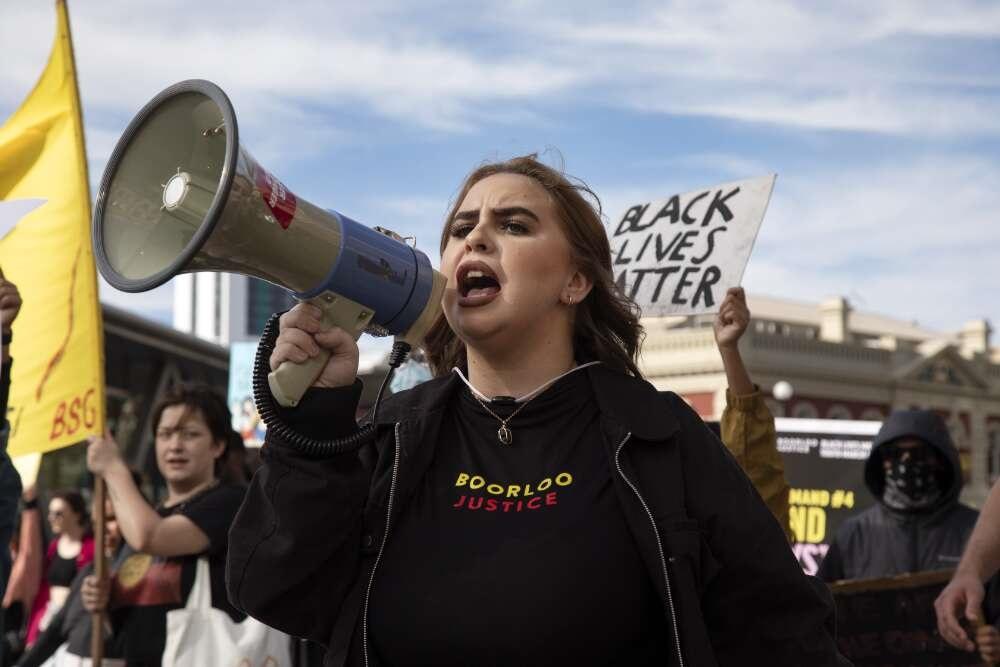
Philip Gostelow, Protester Tanesha Bennell holding a megaphone at the Black Lives Matter protest rally, Perth, Western Australia, 2020, nla.gov.au/nla.obj-2868409850
Philip Gostelow, Protester Tanesha Bennell holding a megaphone at the Black Lives Matter protest rally, Perth, Western Australia, 2020, nla.gov.au/nla.obj-2868409850
Key sources
We are continuing to expand our collection on this topic, with materials found in our pictures collection and through the Australian Web Archive.
- There are various web page snapshots found under the Black Lives Matter movement, from the official website through to ABC website reports.
- Additionally, the pictures from Philip Gostelow are another great resource, with many taken during the protests.
Search tips
Use keywords to search by title, author or subject in the catalogue or Trove.
Try these search terms:
- Black Lives Matter Australia
- Black lives matter movement
- #BlackLivesMatter
- Philip Gostelow
You can also search more broadly using these subject headings:
Aboriginal Day of Mourning 1938
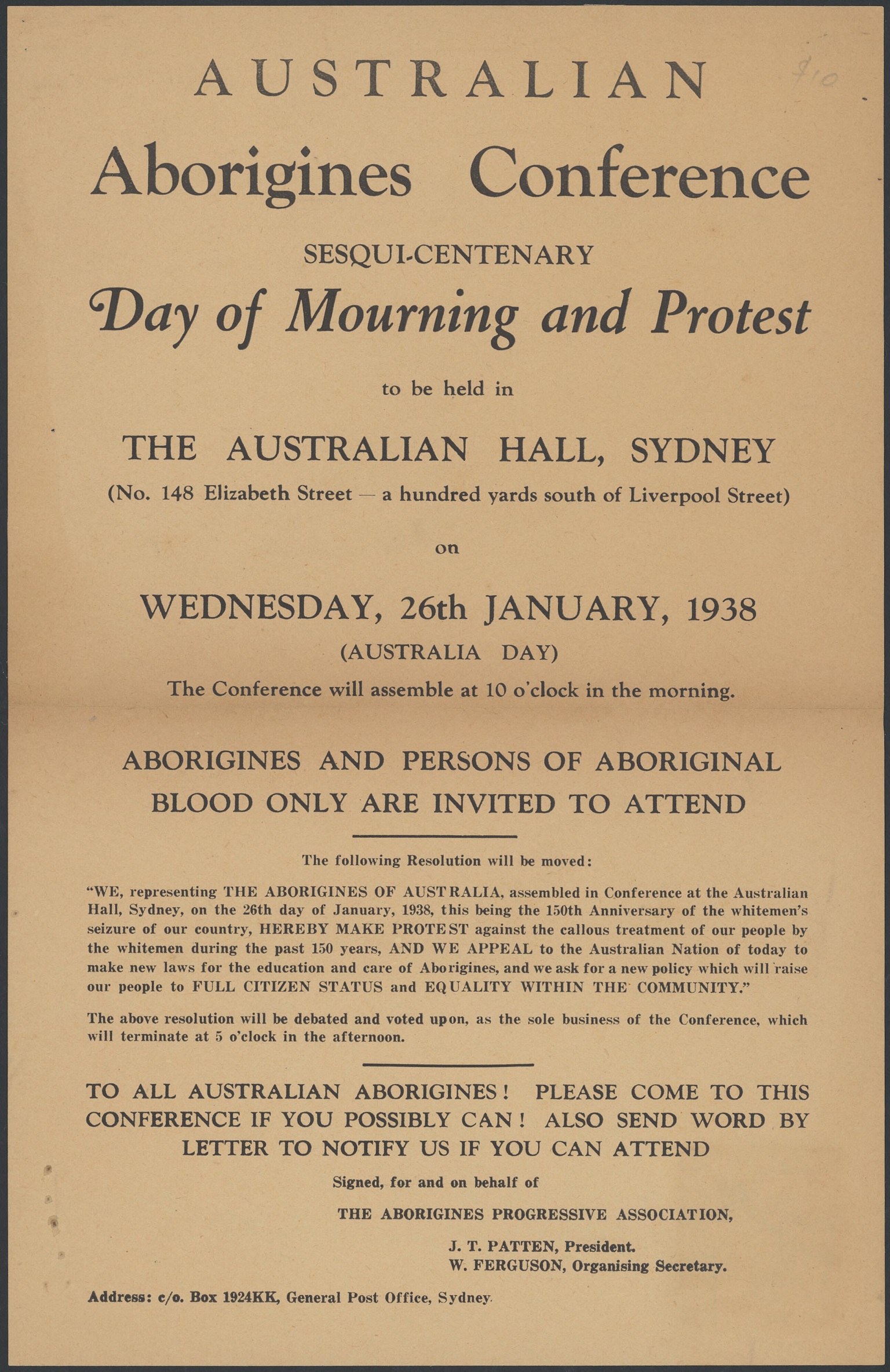
J.T Patten & W Ferguson & Aborigines Progressive Association, Australian Aborigines Conference : sesqui-centenary Day of Mourning and Protest to be held in the Australian Hall, Sydney ... on Wednesday, 26th January 1938 (Australia Day), 1983, nla.gov.au/nla.obj-348899812
The Aboriginal Day of Mourning was held on the 26th of January 1938, during the 150th anniversary of the landing of the First Fleet. The event was a protest to the discrimination and marginalisation faced by all First Australians at the time, led by Jack Patten, William Ferguson, and William Cooper.
Key sources
The National Library holds some interesting collection material for the Aboriginal Day of Mourning, including some of the original flyers used to advertise the event.
Search tips
Use keywords to search by title, author or subject in the catalogue or Trove.
Try these search terms:
- Aboriginal Day of Mourning 1938
- Aborigines Conference 1938
- Aborigines Progressive Association
Get help with your research
Our specialist staff can help you with your research, to locate resources and to use our microform and scanning equipment, but they cannot undertake extensive or ongoing genealogical, historical or other research on your behalf.
Find out more in our Information and Research Policy.